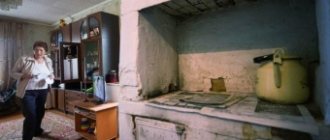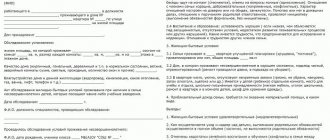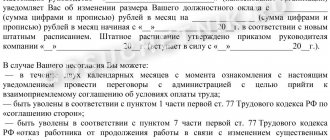In 2005, the Housing Code introduced the concept of “deterioration of living conditions.” Its principle is that citizens try in different ways to damage real estate in order to obtain new housing. Today, there are many reasons why people may be denied one.
But at the same time, it must be said that no one, anywhere, has fully specified the circumstances under which a person’s actions can be considered intentional in relation to damage to his property, which has affected the deterioration of living conditions.
Only the Constitutional Court is given the right to accurately determine the essence of such a concept as “intentional deterioration of living conditions.” Moreover, this applies to both ordinary citizens and military personnel, and a minor child.
What actions might fall into this category?
Deterioration of living conditions is:
- Personal account section;
- Reduction of living space as a result of exchange;
- Failure to comply with the provisions of the residential lease agreement, as a result of which government authorities were forced to resort to judicial eviction. For example, failure to pay the due rent for six months may result in eviction to another, less comfortable premises;
- Registration of additional residents upon marriage or divorce, which is considered sufficient grounds for inclusion in this category;
- Carrying out various operations with shares of residential premises: allocation, determination, change;
- Sale (transfer) of the entire residential premises or any shares thereof according to the transaction;
- Refusal to use existing residential premises in accordance with the social tenancy agreement.
Consequently, we are talking about certain actions, as a result of which there is a need for the participation of government bodies in providing the citizen with other housing.
Intentional deterioration of living conditions
Article 53 of the Housing Code of the Russian Federation deals with the deliberate deterioration of living conditions. Its essence lies in the fact that if citizens, seeking to register in order to obtain living space, take certain actions that are unlawful from the point of view of the code, then they are deprived of the right to make such attempts for five whole years.
The problem with this article, and, accordingly, with those citizens whose housing situation somehow falls under its provisions, is that there is no clear interpretation of what is considered intentional deterioration. Otherwise, even the birth of a child or one spouse moving into the living space of the other after marriage may be classified as a deliberate deterioration of living conditions. Therefore, in many regions and large cities, local governments are forced to make their own additions and adjustments to the existing provisions of the Housing Code of the Russian Federation.
Liability for intentional impairment
It follows from Article 53 and the comments to it that even marriage or the birth of a child will not be taken into account if the person is an offender and is punished with a 5-year ban.
And since Article 53 lacks a clear explanation of what exactly constitutes an offense, regions are given the right to independently develop legal acts on the basis of Art. 53 to identify deliberate actions, and 15 regions took advantage of this right.
How to privatize a garage in a garage cooperative? Read about the methods and rules of privatization in the article at the link.
Because of this, there is no precise interpretation of the law and no definition of clear punishable actions; as a result, the rights of citizens are very often violated.
Important: despite the fact that the liability for intentional actions is 5 years of failure to register the violator of the law, and the case is extraordinary, the authorities’ decision can be challenged in court if there is irrefutable evidence to the contrary.
Legal consequences.
Judicial practice in this category of cases
Since this circumstance is quite new, it arouses genuine interest among specialists. This leads to the following comments from them:
- As for military personnel, they encountered the practice of deliberate deterioration back in 1998, approved by the Government rules for the use of housing, which clearly described violations in relation to housing;
- In the city of Moscow and throughout Russia, this practice of registering citizens in need of housing has been used since 1984, and with the approval of the decision of the Moscow City Council in 1997, it lost force and already in 2003, changes in the Housing Code of the Russian Federation received a new life, as determined by Article 53.
This basis is widely used in practice:
- The Constitutional and Supreme Court in their positions state that in order to admit a citizen’s guilt, it is necessary to identify in detail all the circumstances that led to the artificial deterioration of housing conditions and only after that limit their rights.
They separately highlight the issue of registration, which relates more to the competence of registration authorities employees and cannot be a deliberate action on the part of citizens.
It is also possible to challenge in court the decision of the housing authority that the actions were premeditated when incapacitated parents moved to live with military personnel, since the Instruction leaves a fairly wide range of actions on this issue.
An example of this could be the appeal of such a decision by the Military Court in the case dated June 18, 2010 of the Pushkin garrison.
- As it turns out in judicial practice, it is very difficult to convict a person divorcing a marriage of self-interest. After all, this provision is regulated by the Family Code and relates to personal problems, which come first, and property disputes are its derivative and occupy second place.
With such an explanation, it is impossible to convict a person of self-interest, guided only by the most conjectures and assumptions; it is necessary to have indisputable evidence in order to accuse a person of intentionality at this stage, because for this it is necessary to identify the cause and initiator of the breakup, to understand the very essence of the relationship between people who can have many aspects.
What is a dacha amnesty? You will learn about the design of the site from this material.
However, even with such great contradictions in judicial practice, there is an example of refusal of a request to improve living conditions after a divorce dated March 13, 2007 by the decision of the Moscow City Court.
What actions do not constitute a deterioration of living conditions?
Actions that are not deterioration of living conditions do not include:
- Moving minor children to the place of residence of either parent;
- Move-in of a spouse, parents, and other categories of citizens who are within a certain degree of relationship, subject to the norms established by law;
- Legal operations to terminate the annuity agreement at the initiative of the recipient;
- Refusal to accept a gift by the donee, refusal of the donor to fulfill the gift agreement;
- If the court recognizes the transaction with residential premises as invalid.
How are square meters calculated?
In legislation, the area of an apartment is taken into account based on the total square footage. It is not the living space that is taken into account, but the corridors, bathrooms, toilets, and storage rooms. The main attention is paid to the size of housing to put those in need on the waiting list.
According to federal documents, a link is provided to the 2008 Instruction, which must be followed when determining a new living space. It specifies standards that exclude unreasonable distribution of square footage, when a bedroom can occupy 5 meters out of fifty.
Local authorities are given the advantage to create their own legislation. Using this method, some regions calculate the total living space contrary to reasonable actions. Even balconies and loggias are included in the standards.
The accounting standard can only be changed by the local government. It may differ in each region. So for Moscow the figure is 10 meters; below this level the criterion of “need” is assigned. There is the concept of “provision norm” - this is the area that civil servants are guided by when determining the next housing. It is larger than the accounting one, and for the current region it is 18 meters.
Living conditions of military personnel
Many questions and discrepancies arise when interpreting legislative norms and legal provisions regarding housing issues relating to such a significant category of citizens as military personnel.
What can be attributed to the deliberate deterioration of the living conditions of military personnel? In accordance with the Instruction “On the provision of service living quarters to military personnel - citizens of the Russian Federation, serving under a contract in the Armed Forces of the Russian Federation,” a serviceman is deprived of the right to register as a person in need of housing if certain actions are taken.
Actions to deliberately worsen the living conditions of military personnel
These steps include the following:
- Intentional change in the order of use of residential premises;
- Exchange;
- Failure to comply with the agreed terms of the social rental agreement;
- Divorce in which there was an allocation of shares of the residential premises;
- Alienation of parts or the entire residential premises, resulting in a violation (downward) of the accounting norm regarding the number of square meters that should fall on each member of a military member’s family.
Alienation includes the following actions
:
- Voluntary transfer of living space from one owner to another as a result of donation;
- Purchase and sale transactions.
If such precedents arise, the right to improve housing conditions should be deprived for a period of 5 years. Only after this period has expired does the serviceman have the right to re-apply for improvement of living conditions.
What are the legal consequences for committing these actions?
Regardless of the fact that deliberately worsening living conditions is an unacceptable action under the law, no serious sanction is provided for this offense.
In accordance with Article 53 of the Housing Code, it is only stipulated that citizens, if they commit actions that worsen their housing conditions, will not be able to stand in line as those in need of improved housing conditions for 5 years. This period will be counted from the moment the action was taken.
Deterioration of living conditions of minors
And in conclusion, a few words about the deterioration of the child’s vital function. This aspect of housing law is also very important in respect of the rights of minors. In this case, we can say the following.
In accordance with Art. 31 of the Housing Code of the Russian Federation, in a situation of divorce from the spouse who owns the residential premises, the former spouse of the owner loses the right to use the residential premises, unless there are some other agreements between the former spouses. But according to the Family Code of the Russian Federation, a child has the right to protect his rights and legitimate interests, for which his parents are responsible. This right is not lost even after the parents divorce. Therefore, voluntary deprivation of a child’s right to use the housing of the spouse who owns this premises may lead to a violation of the child’s rights. Consequently, even after the divorce of the spouses, the child must retain the right to use residential premises in accordance with the provisions of the Family Code of the Russian Federation.
Regulation of this issue in the Housing Code of the Russian Federation
Since this definition is indicated by Art. 53 of the Housing Code of the Russian Federation in a rather laconic form and there is no detailed formulation of what actions are considered intentional; this issue was given a clearer justification by the Constitutional Court in Ruling No. 258-0-0 of July 19, 2007.
What should be the distance from the house to the property line? Full information in this article.
The imperfection of the main legislative act - Article 53 of the Housing Code of the Russian Federation in resolving such a sensitive issue makes it possible for local authorities, whose competence is to consider each case, to abuse the flaws in the article and use it for personal interests.
Legislation
The main legislative act is the Housing Code of the Russian Federation, namely Article 53, which establishes the features and consequences of the offense. However, the LCD does not fully reveal the essence of the phenomenon, partially indicating only actions that may be considered unlawful.
Legal positions of the Constitutional Court of the Russian Federation
Much more attention is paid to the deterioration of the living conditions of children and adults by the Constitutional Court of the Russian Federation. The authority decided that deliberate actions aimed at artificially creating uncomfortable living conditions would be considered an offense.
In the notes of the state organization there is a note that Article 53 of the RF Housing Code should be applied in conjunction with paragraph 3 of Article 10 of the Civil Code.
The Constitutional Court of the Russian Federation states that the actions specified in the documents do not reflect the legal essence of the offense and do not make it possible to limit it from related categories. Due to the incorrect classification, law enforcement authorities are required to study in detail and distribute each case of unlawful actions.
Arbitrage practice
Due to the fact that there is no strict regulation of actions and procedures, each court considers the application individually and is guided by current practice, explanations of higher authorities, as well as local legislation. This means that in each individual case the result can vary significantly. A couple of examples from judicial practice:
FREE CONSULTATIONS are available for you! If you want to solve exactly your problem, then
:
- describe your situation to a lawyer in an online chat;
- write a question in the form below;
- call Moscow and Moscow region
- call St. Petersburg and region
Ask your question to a lawyer
Dear site visitors! Free online legal advice has been operating on our website since 2004. Free legal advice is provided only by practicing lawyers and attorneys in Moscow who have more than 20 years of experience in various areas of law. You can get legal advice for free on our website without registration. If you need legal advice in Moscow, free of charge, online, provided at a high professional level, our website is for you. The answer to your question will be sent to you by email as soon as possible and published on the website. For ease of use, a question and answer rubricator has been developed.
Cost of your lawyer's services
For civil cases
The cost of a lawyer’s services is determined in each case individually, depending on the complexity of the case, the place of proceedings, the qualifications of the lawyer, and may differ from the stated one, either down or up.
How does the state determine the wealth of citizens?
The result of recognition as low-income occurs in each region of the country differently. The average earnings in this area and the average market price of apartments are taken into account. For this purpose, the concept of “property security” was introduced. This criterion is compared with the cost of an apartment that citizens require to meet the standards. If the income is less than the latter, then the family is recognized as needy.
More than 10 points have been introduced to calculate property wealth. There are a number of indicators, if they are violated, the decision changes not in favor of citizens. A family should have one personal account, but if it is split, then the calculation will be separate for everyone.
For quantitative assessment, the total family income and property subject to taxation are taken into account. The normative act for determining the level of security is taken from the month when the application was submitted. Legislation in the regions is updated every quarter. Income is calculated using personal income tax certificates for the previous 2 years.
The value of the property is included in the calculation of property security. It includes all real estate: garages, warehouses, cottages. The assessment is made at the cadastral value. Ownership of movable assets is also considered: cars, boats and other registered vehicles. Savings are taken into account: in a bank account, the presence of share ownership, funds in the form of shares and securities.
Examples
The most common example of deliberate deterioration of housing is the exchange of one living space for another, the size of which is significantly less than required by law. As a rule, it is held between close relatives or friends.
If a family of 3 people changes a 2-room apartment with an area of 50 m² to a one-room apartment, then by law citizens have the right to apply for improved housing conditions. But if it turns out that the actions were committed intentionally, the state will refuse to carry out the procedure.
Proving a violation is quite simple: just study the history of ownership of the property. This can be done through Rosreestr, because all real estate transactions are registered there.
Ways to improve
The state strives to ensure that citizens live in comfortable conditions and is ready to provide certain subsidies. This is especially true for minors and young families - it is these categories of people who are under the close supervision of local authorities.
Ways to improve housing and communal services at the expense of the state:
- Registration of a housing certificate, which allows you to join a vacant apartment in communal housing. The document has a priority order, so you should not expect instant benefits.
- There is a program with the appropriate name for young families. The state provides subsidies or benefits for targeted mortgages aimed at improving living conditions.
- The state provides low-income people with a housing certificate, which allows them to occupy a vacant communal apartment with the opportunity to privatize it.
- Military personnel have the right to receive an apartment after serving for more than 10 years.
As a rule, the housing improvement program is valid for all beneficiaries. To clarify this information, you must contact your local administration.
What it is
The legislation does not contain a specific definition of the phenomenon. There is only Article 53 of the Housing Code of the Russian Federation, which describes the consequences of the deliberate deterioration of living conditions by citizens. However, the specifics of the offense can be established by local authorities.
The offense includes:
- any commercial activities related to moving to smaller housing,
- a fictitious divorce committed in order to obtain additional housing,
- transfer of an apartment from residential to non-residential,
- forced relocation of residents to less comfortable houses due to deliberate violation of rules.
At the same time, local legislation often determines which violation is intentional and which is not. The court carefully examines each situation and makes a decision.
Action Goals
Municipal authorities establish signs on the basis of which offenses can be considered intentional. The list is different in each region, but it has some common points.
A violation will be considered intentional if:
- A citizen wishes to be recognized as needy after he has personally worsened his living conditions.
- There are witnesses who can confirm the intentionality of the actions.
- At the time of committing unlawful actions that entailed deterioration of housing, the citizen was not listed as in need of special authorities.
If a person was already on the list of those applying for social housing, then even deliberate deterioration of the condition of the area will not be considered an offense.









